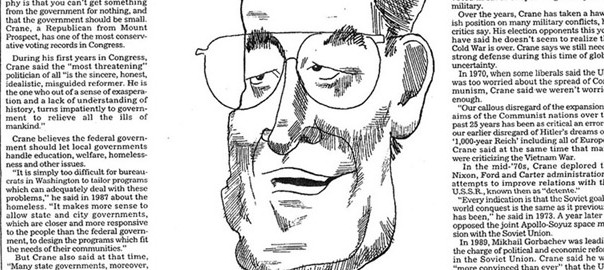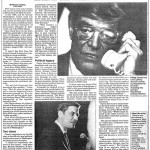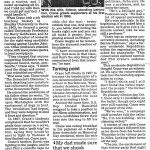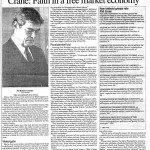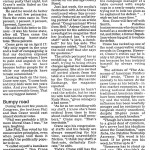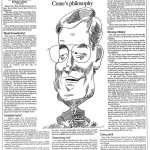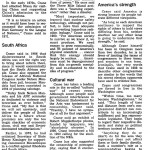This series of articles by Robert Loerzel originally appeared in Pioneer Press September 17 to October 1, 1992. Crane won re-election that year, serving until he was defeated in 2004 by Democrat Melissa Bean. Crane died November 8, 2014, at the age of 84. Crane’s father died in 1995 and his wife, Arlene, died in 2012. Another source quoted in this story, state Rep. Bernard Pedersen, died in 1996.
PART 1
Phil Crane was only 6 years old, but he already knew what political party he liked the best.
It was 1936, and Dr. George Washington Crane took his young son to a train station near their home on Chicago’s South Side. Dr. Crane needed his boy’s help to get that “betrayer” of democracy, Franklin D. Roosevelt, out of the White House.
They stood there on the train platform, practically in the shadows of Chicago’s steel mills, while workers got on the trains. Phil Crane and his father handed out buttons decorated with sunflowers and the name of the Republican candidate who was trying to topple FDR — Alf Landon.
It wasn’t the first time the Cranes found themselves supporting a losing candidate.
“We were always supporting the underdog that never quite made it,” Crane remembers. “But it was always the more conservative of the candidates.”
Even then, Philip Miller Crane and everyone in his family were conservatives. Crane says the political lessons he learned from his father still shape his thinking today, 23 years after he was first elected as the congressman representing the northwest suburbs.
“My dad felt Roosevelt had destroyed the republic,” Crane says. “He’s 91 years of age now and a lot has happened since Roosevelt passed on. But my dad can still get his juices flowing thinking about FDR and the destruction of the republic caused by him.”
Phil Crane shares his father’s hatred of Roosevelt and the welfare system he helped to create. In many of his speeches, Crane repeats one of his favorite lines: Even FDR once called welfare a “subtle narcotic.”
Just what did Roosevelt do that was so awful? Crane says Roosevelt led “people to the nonsense belief that somehow you can get something for nothing out of Washington.”
Crane’s supporters say his life story is the tale of a true political thinker who went to Washington and stuck to his principles.
“I think he represents the wave of the future,” said state Rep. Bernard Pedersen, R-Palatine, praising Crane’s belief in a smaller federal government that keeps its hands out of the economy.
But Crane’s critics say his biography is the story of a man who has had extreme right-wing views for all of his life, and who has never come to the realization that his ideas don’t work in the real world.
“Phil lives in an ivory tower,” said Palatine Democrat Sheila Smith, who is running against Crane in this November’s election. “He entered it when he was teaching in the 1950s, and he never came out. (But) the real world doesn’t work that way.”
“Phil Crane’s a dinosaur,” added Arlington Heights independent Joe Dillier, who is also running against Crane Nov. 3. “He is with that wing of the Republican Party that is always trying to dictate everything from Washington. They’re trying to dictate our values. If Washington will take care of the fiscal matters, we’ll take care of the family values.”
Crane, who has seven daughters and one son, says he learned his family values from his father. George Crane came from a farm in Indiana and worked his way through no less than five college degrees. Then for good measure, George Crane helped get his brothers and sisters through college, too.
Although he studied to be a physician and psychologist, Dr. Crane became famous as a newspaper columnist. Three hundred newspapers carried “The Worry Clinic,” in which Dr. Crane dispensed medical advice and conservative ideas about sex and marriage. He also gave out medical tips on WGN radio.
If there was any doubt Phil Crane would be a Republican, a visit to his great-grandfather’s house in Indiana erased it.
“My dad made sure that we shook hands with him, because he shook hands with Abraham Lincoln,” Crane says. “In 1858, he went over to Danville in a covered wagon and sat in Lincoln’s lap. And Lincoln patted him on the head and shook his hand and said, ‘You know, you’re a fine young Republican, boy, and you stick with it.’ So we were knee-jerk Republicans because of that inheritance.”
Young Phil didn’t want to be president when he grew up. He didn’t even want to be a congressman.
But he did want to study history. His best friend in fifth grade, Harvard Fishman, was a child prodigy, one of the World War II-era “quiz kids.” While Crane listened to the radio at home, his friend Harv answered questions about history.
“He got me turned onto history,” Crane says. “It became a fascination to me.”
Crane went on to become a history professor, while his pal, Harvard Bennett Fishman, changed his name to Harv Bennett and became a movie producer.
Crane remembers himself as a mischievous child, while his older brother, George, was the “straight arrow.” But George died in an airplane crash in 1956, leaving Phil as the oldest child in the family.
By the time he reached graduate school, Crane was holding himself to a strict discipline. He told his girlfriend, Arlene Johnson, he would marry her, but only after he found out he could make the grade.
“I told her I wanted to see if I could cut the mustard, because I’d been in the Army for two years and had been a traveling salesman for a couple of years,” he recalls. “I wasn’t sure I could maintain the discipline.
“I set up a schedule for myself. No TGIF parties or any of that nonsense. I signed up for all 8 a.m. classes, five days a week,” he says. “I disciplined myself: made my bed, did calisthenics in the morning, went to the classroom, then to the library and home. It was a routine, and I ended up making all A’s. And I told my wife then we could get married. I could handle it.”
When Crane took a job teaching history at Bradley University in Peoria in 1963, he formed a group called University Professors for Barry Goldwater, and he became director of research for the right-wing candidate running against Lyndon Johnson. Other professors attacked Crane with anonymous quotes in local newspapers.
“They charged that anyone supporting Goldwater was an insipient fascist, racist, anti-Semite,” Crane says. “I didn’t mind the slings and arrows. … I just redoubled my efforts.”
That same year, Crane wrote “The Democrat’s Dilemma,” a book detailing how socialists had influenced the direction of the Democratic Party.
He echoed the sentiments of his father when he wrote, “In 1933, the Marxists descended upon Washington with the excitement of dogs in heat. The ‘revolution’ had begun, and they were helping to lend it force and direction.”
In 1967, Crane’s students complained that he wouldn’t grade their scores on a curve, and they laid a “guilt trip” on him, saying they would be sent to fight in Vietnam if they flunked out, Crane says.
Crane’s brother, David, was fighting in the jungles, and he sent Phil a cassette tape he recorded during a battle.
“It is wild,” Crane recalls. “You hear, ‘BOOM-boom-rat-tat-tat-tat-tat! You know, everything going off. And this kid is very calmly calling in artillery rounds … and simultaneously, he’s calling in air ‘strikes and the napalm bombs are going off. … You hear some foul language, too. Finally you hear this rough sergeant, ‘OK, we got ’em on the run. Run up that body count!’ Rat-tat-tat-tat!”
Crane says he brought the tape into his classroom and played it full-blast over the lecture hall’s speakers.
“I said, ‘Now you people have heard from my brother. Those of you in this class that are telling me that I’m responsible (for the war) — better rethink that one. And secondly, you better start hitting the books right now and you can all make A grades. But no playing around on Fridays.”
Crane laughs as he remembers the stunned reaction of his students.
“I have encountered kids today that were in that class, and that’s the only thing they remembered from that semester,” he says.
Crane left Peoria in 1967 to become the headmaster of a non-denominational Christian school in Northbrook, Westminster Academy, but he quit a year later when the school became denominational. He planned to spend the next year or so writing a book.
Around the same time, U.S. Rep. Donald Rumsfeld resigned to take a position in the Nixon administration, and seven candidates threw their hats into the ring to fill his seat.
Crane was eating breakfast in his pajamas on a family farm downstate on Memorial Day weekend, when his wife burst out laughing at a newspaper column. None of the candidates in the congressional race had sparked any interest, the columnist said, but people were calling for Crane to run!
The next week, Crane was bombarded with telephone calls from parents at the school, including Bernie Pedersen. Crane decided to run, thinking it would take up only three months of his time.
Crane says he thought “it would be interesting hands-on experience to take back into the classroom.”
He also wanted to teach the media a lesson, since they were saying this suburban district had gone liberal after it supported Goldwater in 1964.
The handsome, dark-haired Crane, who was 38 at the time, got the endorsement of only one GOP group: the Palatine Township Regular Republican Organization. Some of the Palatine Republicans really took notice of Crane, Palatine Township Assessor Art Jicha remembers.
Crane was different, not just a run-of-the-mill politician, Jicha says. He was a professor, and he knew the issues.
“He’s a brilliant guy,” Pedersen says. “He had a lot of appeal personally. He’s very articulate. In the beginning, if you asked him a question, he’d give you a 15- minute answer, like he was still a professor.”
“There was an extreme conservative element, including Bernie Pedersen,” says a former moderate Republican within the organization, who asked for anonymity. “This conservative element ram-rodded Phil Crane’s endorsement.”
This moderate Republican thought Crane was an extremist. He says the conservatives took over the township organization in a coup.
“I didn’t think and I still don’t think (his views) represent the people,” the former Republican says.
By primary election day, Oct. 7, there were 11 candidates on the ballot, though only eight were still running. Crane won 23 percent of the vote.
“We’ve won,” a campaign staff member told the caller. “No, I’m not kidding — we’re claiming victory.”
A stream of cars with Crane bumper stickers followed him as he drove from his home in Winnetka to the victory party in Niles, honking their horns all the way.
“The joy, the excitement of that victory party that night when we won that primary was unlike anything I’ve experienced since,” Crane says. “But the next morning, it was like, ‘Good grief! What did I do?’”
That was the last time Crane ran against another Republican for his congressional seat, until Gary Skoien challenged Crane this year.
Crane had no problem winning the general election against a Democrat in November 1969, and he has practically coasted to victory in every election since then. Sheila Smith and Joe Dillier are hoping this year will be different.
PART 2
When Phil Crane first in Washington in 1969, the history professor was struck by the realization that he was making history instead of just teaching it, he says.
How will the history books remember Crane, the Republican congressman who represents northwest Cook County and western Lake County?
Crane says he has made history by “keeping the faith” and voting against tax increases and government spending. But his opponents in the Nov. 3 election, Democrat Sheila Smith and independent Joe Dillier, say Crane has been an ineffective legislator who will be little marc than a footnote in the history books.
Although Crane was the last person elected to Congress in the 1960s, he didn’t want people to think of him as a typical ’60s politician. As he took office he predicted Ronald Reagan would be elected president in 1976, and the Republicans would take control of both the House and Senate in the same year.
But a few years later, something happened that indefinitely postponed Crane’s dreams of a GOP-controlled capital: Burglars broke into the Watergate hotel, sneaking into a Democratic campaign office. At first, Crane didn’t think much of the news stories about the Watergate break-in.
“I figured you can have some nitwit down the line who thinks it’s essential to break in and enter Democratic headquarters, but I couldn’t believe the president was involved in any way …” Critics accused Nixon of covering up, Congress held televised hearings, fingers were pointing at the White House …
“It got worse and worse. And then the tapes, and his stupidity in hanging onto those tapes.”
Then there were calls for impeachment, followed by Nixon’s resignation and the 1974 elections. Republicans around the country were getting tarred by the same brush of political corruption, even if they had nothing to do with Watergate.
“It was devastating,” Crane says. “Had it not been for Watergate — and I’ll never forgive Nixon for that — we would have definitely had both houses of Congress.”
Although more than 40 Republicans lost their seats, Crane still held onto his dream of Ronald Reagan becoming president, and he supported Reagan’s campaign in 1976. But Ford got the nomination, and Carter got the White House.
After two years of witnessing the Carter administration “disaster area,” as he calls it, Phil Crane took the biggest political leap of his life.
Fearing that Reagan might not run for president the next time around, or that Reagan had missed his final chance in 1976, Crane started thinking about running for president.
“I wrestled with it,” he says. “It seemed a little too awesome to contemplate.”
He made the announcement Aug. 2, 1978, more than two years before the election. No presidential candidate in the history of the United States had ever announced his candidacy so early.
At the same time, both of his brothers were running for Congress: Daniel Crane the dentist campaigned in Danville, Ill., while David Crane the psychiatrist-lawyer campaigned outside Indianapolis.
Suddenly, the Cranes were the center of national media attention. Never in the history of the U.S. had three brothers run for Congress at the same time. Newsweek, Time, People and all the magazines started referring to the Crane family as the “Kennedys of the Right.”
Dan joined his brother in the House, though David lost. And the Phil Crane campaign for president went full-steam ahead, with Rich Williamson — the same Rich Williamson who’s running for Senate this year — as campaign manager. Of course, Reagan did end up running after all.
Trouble hit the Crane campaign in March 1979.
The publisher of the Manchester Union-Leader, William Loeb, the same man who called Dwight D. Eisenhower “a stinking hypocrite” and John F. Kennedy “the No.1 liar in the U.S.A.,” picked Phil Crane as his next target.
Loeb’s newspaper filled more than 100 sensationalist column inches with anonymous attacks on Crane’s personal life. Crane charged that the Reagan campaign was behind the attack story, Reagan claimed he didn’t know anything, and People magazine said Crane was the victim of a “Loebctomy.”
Two months later, a dozen campaign staff members resigned en masse, including Williamson. Just as candidates’ wives have entered the spotlight in this year’s election, Crane’s wife Arlene became a focus of media attention during his presidential campaign.
The strangest moment of the media circus came in the fall of 1979, when Arlene Crane was arrested for violating pet regulations at the Crane home in Fairfax, Va. The family’s Labrador retriever bit a 6-year-old boy, then Arlene Crane refused to allow authorities to take the dog away to be tested for rabies.
According to the New York Times, “Mrs. Crane raised such a ruckus that an officer was summoned from the county detention center to restrain her.”
But the dog turned out to be rabies-free, the bitten boy was just fine, and Arlene Crane was found not guilty of all charges against her. And the campaign went on.
Phil Crane vividly remembers the grueling, repetitious schedule, flying around the country, spending day after day in New Hampshire, seeing shadows of Secret Service men hanging around outside his office door.
“You’d go to a friend’s house for dinner and all of a sudden you’re startled because you see these people in raincoats walking back and forth,” Crane says.
Three days before the New Hampshire primary, there was a debate scheduled between the two frontrunners, Bush and Reagan. The other candidates — Crane, John Anderson, Bob Dole and Howard Baker — weren’t invited, but they showed up anyway.
Reagan said he wanted them to join in the debate, but Bush sat on the stage, scribbling on a notepad, refusing to meet their eyes. Reagan said, “Well, what can I do, guys? I guess it’s just George and me.”
“So we all filed off the stage and Dole turned to Bush on his way off and said, ‘You S.O.B.! I’m never going to forgive you for this,” Crane recalls.
Following that debate, there was little doubt that Reagan — not Crane — would capture the conservative vote.
“I got to thinking about it on my way to the hotel that night,” Crane says. “And I still suspect that the Reagan people set us all up. That they created this, knowing that they could irritate George.”
After campaigning a total of 63 days and spending $250,000 on the New Hampshire primary, Crane got only 2 percent of the vote on Feb. 26, way behind Reagan’s total of more than 50 percent.
A crowd of cheering supporters sang “For He’s a Jolly Good Fellow” in the room Crane had reserved for his victory party that night, but Crane’s smile faded as the night went on.
He said he would do better in the next few primaries. Then the votes came in. Two percent, 1 percent, 3 percent, 2 percent, 2 percent.
He said he’d do better in Illinois — it was his home state, after all. Then came the embarrassing home-state total. Three percent.
Crane gave up on April 17: “My only regret in the year and a half of campaigning is that my decision exposed innocent people whom I love to pain and anguish in the process. But we have become better people for it while our standards have remain untarnished.”
Looking back on the race, Crane now says, “I came back and (my) kids were two years older. And you know, those are unrecoverable times. That was my biggest lament.”
During the next few years in Congress, the brothers Phil and Dan Crane would cast almost identical votes.
“Phil was probably a little more liberal than I was,” he says, laughing.
Like Phil, Dan voted by his conservative principles, even when people told them it wouldn’t be politically popular to do so.
“I called myself a kamikaze congressman,” Dan Crane says.
In 1982, Phil Crane had a close call with a minor scandal when he was arrested on drunken-driving charges in California. But once again, the Cranes were vindicated by the courts. A jury found him not guilty in June 1983.
However, the Crane family was rocked by a scandal that grabbed national headlines only a month later.
An investigation revealed Dan Crane had an affair three years earlier with a 17-year-old female congressional page. He held a news conference with his family at his side and tears in his eyes: “I have broken the law of God, and I can only ask for God’s forgiveness, my wife’s forgiveness and my friends.”
Dan Crane lost re-election in 1984, and went back to his dentist’s office in Danville.
Once again, Phil Crane was the only Crane in Congress. But the Cranes have remained a political family — his sister, Judith Crane Ross, served on the DuPage County Board.
Just last week, the media’s fascination with Arlene Crane continued when Spy prominently featured an unflattering portrait of her in an article about “Congressional Wives from Hell.” Arlene Crane told a reporter for the satirical and investigative magazine that her husband has “a rotten staff” with “a jerk, a dumbbell” for his top aide. The magazine added, “And that’s the mild stuff that she says for quotation.”
The article portrayed her as meddling in Phil Crane’s staff, trying to bring ethics charges against her husband’s employees. She also carried off potted plants from the table at a recent soiree hosted by the Chicago Mercantile Exchange, the magazine reported.
Phil Crane says he hasn’t read the article, but he says his wife told him the reporter, Rudy Maxa, “gives misogyny a bad name.”
“As far as her meddling with my staff, I know she’s been critical from time to time about individual staff members,” Crane says. “That’s inevitable.”
Crane says his congressional staffs and his family are always competing for his time, causing unavoidable friction. “I think (my staff) is first-rate, definitely first-rate,” he adds.
Today, Crane still has the square-jawed, handsome looks he became known for in his younger days, but wrinkles and gray hair are showing. This year’s Election Day, Nov. 3, is also his 62nd birthday.
The youngest of his eight children just left home for college, although Arlene Crane just added five shih tzu puppies to the household. “It’s just like a second family,” Phil Crane says.
During speeches and interviews, Crane jumps from one anecdote to another, but he always seems to keep the main line of the conversation in the back of his mind. Crane expounds for five or 10 minutes at a time about politically unconventional topics like phonics or the therapeutic benefits of drinking ocean water.
Earlier this spring, Palatine resident Gary Skoien ran a tough campaign against Crane in the Republican primary, issuing press releases day after day that put Crane on the constant defensive.
But Crane won with 55 percent of the vote. At his victory party, dozens of Phil Crane fans — most of them women about his age — crowded around him, making it nearly impossible for a reporter to edge in and ask a question. Each woman wanted her picture taken with the congressman.
An hour later in a hotel a few miles away, Skoien sat with his campaign manager at a table covered with empty cups in a nearly empty room, trying not to look too glum as he explained his defeat. “ … I wish we had more time.”
Now, Crane will face off with Smith, a Palatine busineswoman who describes herself as a moderate Democrat, and Dillier, a former Republican whose top goal is to reduce the deficit.
Crane has racked up one of the most conservative voting records in Congress. However, Crane’s critics say he is only a bit player in Washington because he has isolated himself by always voting “no.”
The editors of “The Almanac of American Politics 1992” wrote, “There is an anomaly to his career. At the same time as his beliefs — in free-market economics, in a strong national defense, in traditional American ideals have been sweeping the country and the world, his own influence has been woefully meager and he continues to languish mostly unnoticed, despite 20-plus years of seniority, on back benches.”
“Though he’s been exposed to a great deal of cynicism, he’s never lost his idealism about the Constitution,” says Jicha, the Palatine Township Assessor. “His word is his bond. If he gives you his word, he’ll live up to it.”
“Someone has to stand up and say, ‘We shouldn’t do this,’” State Rep. Bernard Pedersen, R-Palatine, says.
Crane says he has watched good people go to Washington, planning to fight for their principles.
“And then after a while, they get beaten back so many times, they kind of become ‘go along, get along.’ And, you know, what’s the point of serving down there?” Crane says. “There are better things to do with your life.
“If you give up the faith, get out of Congress and let someone else come down here to fight.”
PART 3
When U.S. Rep. Philip Crane was a boy, his father never gave him an allowance.
“We had a kind of laissez-faire, free-enterprise childhood,” remembers his brother Dan Crane, who also served in Congress. “We were never given allowances. You had to go out and perform a task before you were rewarded.”
That childhood experience helped form the political philosophy shared by both brothers, Dan Crane says.
The essence of Phil Crane’s philosophy is that you can’t get something from the government for nothing, and that the government should be small. Crane, a Republican from Mount Prospect, has one of the most conservative voting records in Congress.
During his first years in Congress, Crane said the “most threatening” politician of all “is the sincere, honest, idealistic, misguided reformer. He is the one who out of a sense of exasperation and a lack of understanding of history, turns impatiently to government to relieve all the ills of mankind.”
Crane believes the federal government should let local governments handle education, welfare, homelessness and other issues.
“It is simply too difficult for bureaucrats in Washington to tailor programs which can adequately deal with these problems,” he said in 1987 about the homeless. “It makes more sense to allow state and city governments, which are closer and more responsive to the people than the federal government, to design the programs which fit the needs of their communities.”
But Crane also said at that time, “Many state governments, moreover, arc running budget surpluses while the national government is running a massive deficit.”
That’s no longer the case. Illinois, New York, California and many other states have had severe budget crises.
Crane says the government shouldn’t meddle in the economy and he doesn’t believe in the idea of economic planning. Let the “invisible hand” of the free market do its work, he says.
Crane blames government regulation for many problems, from inflation in the 19705 to rising health-care costs. He opposed the Occupational Safety and Health Act in 1972, which set safety standards for American workers, because he said it would over-regulate businesses.
Crane opposed raising the minimum wage in 1989, saying it would cause companies to slash unskilled and part-time jobs.
Crane’s in favor of unrestricted free trade, and he dismisses the idea that a free-trade agreement with Mexico would send jobs south of the border.
“To meet what is expected to be a giant demand for quality goods in Mexico, more jobs requiring skilled labor will consequently be available to Americans and as a result, the standard of living in both countries will flourish,” he said in 1990.
Crane says with pride he has never voted for a tax increase. During the 1984 presidential campaign, he attacked Walter Mondale for favoring higher taxes on the rich. Crane said people who used to be considered rich — people who make more than $60,000 — had become middle-class workers because of inflation.
“In social policy debates over the years, Congress has usually sided in favor of the deserving poor when it carne time to transfer wealth from the upper income segments of our society,” he said. “Perhaps Congress should now recognize the contributions which the deserving rich have given the nation. These are the industrious people who pay more than their fair share of taxes to support government programs. These arc also the citizens who channel their disposable income into purchases of consumer goods and productive investments which rejuvenate the economy.”
And in 1983, Crane said Reagan’s supply-side economies had been a success. He criticized gloom-and-doom Democrats for warning that bad economic times were ahead.
He said politicians in “opposition to economic prosperity always talk of gloom, crash and recession. There is no reason for the people of this country to accept this doomsday forecast.”
Crane says his two greatest legislative accomplishments were the passage of a law in 1974 making it legal for Americans to own, sell and trade gold and the passage of a law in 1981 indexing the income-tax brackets. Because of that law, income brackets change with the cost of living each year.
Crane has long been in favor of a Constitutional amendment requiring a balanced budget.
The one area where Crane has frequently voted in favor of spending money is the military.
Over the years, Crane has taken a hawkish position on many military conflicts, his critics say. His election opponents this year have said he doesn’t seem to realize the Cold War is over. Crane says we still need a strong defense during this time of global uncertainty.
In 1970, when some liberals said the U.S. was too worried about the spread of Communism, Crane said we weren’t worried enough.
“Our callous disregard of the expansionist aims of the Communist nations over the past 25 years has been as critical an error as our earlier disregard of Hitler’s dreams of a ‘1,000-year Reich’ including all of Europe,” Crane said at the same time that many were criticizing the Vietnam War.
In the mid-’70s, Crane deplored the Nixon, Ford and Carter administrations’ attempts to improve relations with the U.S.S.R., known then as “détente.”
“Every indication is that the Soviet goal of world conquest is the same as it previously has been,” he said in 1973. A year later he opposed the joint Apollo-Soyuz space mission with the Soviet Union.
In 1989, Mikhail Gorbachev was leading the charge of political and economic reform in the Soviet Union. Crane said he was “more convinced than ever” that the U.S. should not improve its relations with the Soviet Union.
“Although the Soviet Union has taken some steps to allow greater freedom at home, the rate at which they continue to build, modernize and reshuffle their military forces certainly makes me question their sincerity in wanting to reform,” he said.
Even today, Crane expresses concern that the former Soviet republics could cause trouble for the United States. With the unstable economic situation in Russia and the former Soviet republics, the U.S. should keep a strong military, he says.
One of the few issues where Crane has changed his position during 23 years in Congress is the question of how the United States should trade with Communist China.
In 1983, Crane introduced a resolution saying that the U.S. should not extend Most-Favored Nation (MFN) trading status to the People’s Republic of China.
“I believe that it is foolish for the U.S. government to force the taxpayer to provide what amounts to a subsidy to a totalitarian country, which engages in all the attendant repressions of freedom and basic human rights,” Crane said, adding that the worst of China’s human-rights violations was the law allowing parents to have only one child.
But after Chinese leader Deng Xiaoping moved China toward free-market reform, Crane reversed his position. Despite China’s continued human-rights violations, Crane says the country is moving in the right direction because of its economic policies.
“Isolationism is a failed policy, for the United States as well as China,” Crane said earlier this year. “MFN gives us the best hope of staying engaged, creating appropriate and effective leverage, and tailoring our actions so that we succeed in getting further meaningful changes in Chinese practice.”
In the early 1970s, Crane had attacked Nixon for visiting China and supporting China’s admission to the United Nations.
“It is as bizarre an action as it would have been to recommend the admission of Nazi Germany to the League of Nations,” Crane said in 1971.
Crane said in 1986 that disinvestment in South Africa was not the right way to bring about reform there, since it would economically hurt the South African people. Crane also opposed the release of African National Congress leader Nelson Mandela from jail, because Mandela had been convicted in 1964 of planning sabotage.
“Today finds Nelson Mandela and his ANC comrades as dedicated to violence and terrorism as ever before,” Crane said. “My fear is that we will act unwisely, and deliver the people of South Africa to a future whose promises are only the too tragic shackles of economic chaos, civil war and Soviet-dominated totalitarianism.”
Earlier, in 1976, he had criticized Secretary of State Henry Kissinger for supporting communist Mozambique in a conflict against Rhodesia and South Africa.
Crane said South Africa had many terrible policies but that the people there had “more freedom than do those living elsewhere on the African continent. … There is freedom of religion, vigorous opposition parties and a vocal free press. None of this may be said about the country Dr. Kissinger would like to subsidize — Mozambique. That country is a one-man, one-party dictatorship which has eliminated freedom of religion, is’ eliminating private property and has imprisoned all who fail to submit.”
Here’s how Crane stands on some other issues: He opposed the Panama Canal Treaty so strongly he even wrote a book about it. He has frequently called for the government to pursue the issue of soldiers missing in action.
He won’t let gun-control advocates take any sort of firearms from American citizens. He calls affirmative-action quotas a form of reverse racism. He thought mail delivery should be opened up to private competition, and he was opposed to the mandatory teaching of the metric system.
Crane favors widespread use of nuclear power, calling it “the safest and cleanest form of power.” He once said the Three Mile Island accident was a “learning experience” rather than a disaster.
“Most important, we learned that nuclear safety technology, although not perfect, is more than adequate in preventing hazardous radiation leakage,” Crane said in 1980. “For American society to survive as we know it, we must produce. We need energy to grow economically, and 95 percent of America’s physical scientists … concur that this energy should largely be nuclear. Americans must be deprogrammed from this no-growth mentality and re-educated to the idea of progress.”
Crane has taken a leading role in the so-called “cultural war” of recent years. Although some people said government interference in the National Endowment for the Arts was tantamount to censorship, Crane said, “Frankly, I have no sympathy at all for that argument.”
Crane said an exhibit of Robert Mapplethorpe photos, funded by taxpayers, was “absolutely obscene.” In 1990, Crane introduced a bill in 1990 calling for the abolition of the NEA.
Crane has also supported the censorship of pornography, saying that it encourages violence.
But he took a strong stand in favor of freedom of the press in 1978, when he introduced a bill saying that “no journalist must respond to search warrant or subpoena regarding the production of journalistic property.”
Although Crane said he himself had been the victim of “outright lies” in the media, he said, “The press is the only constant and vigilant watchdog of the government, the overexpansion of which our Founding Fathers so feared. Yes, the abuses by the press have occurred, yet I would argue that the abuses by the government have been more numerous and egregious in nature.”
Crane opposes abortion except in cases where a minor is raped, incest takes place between minors or when the mother’s life is in danger. But after the Supreme Court’s Roe v. Wade decision in 1973, Crane did not favor making abortion illegal.
Instead, he introduced a bill that would have made it illegal for the Supreme Court and other federal courts to rule on the abortion issue.
“The result would be variation from state to state in keeping with the ideals and morals of the people in the various states,” Crane said.
Crane said America is strong because its people tolerate different viewpoints.
“As long as each American continues to respect the rights of others to hold views differing from his, neither abortion nor any other Issue is going to undermine that strength,” he said.
Although Crane himself has been in Congress more than two decades, he is in favor of limiting the terms of congressmen to three terms and senators to one term. Ironically, the very words that Crane used in 1988 to describe other congressmen are similar to the words that his recent election opponents have used to criticize him.
Crane said congressmen are forced to live in the Washington area.
“Within time, too many become Washingtonians,” he said, “This length of time and distance from one’s congressional district can contribute to an increasingly indifferent and less representative legislator. They begin to regard their respective districts and states as political territory instead of home.
“Anything they do or (don’t) do for the area they represent does not affect them or their family directly. Such a member’s role as a representative begins to diminish.”
His Democratic opponent in the Nov, 3 election, Sheila Smith, says, “I think he’s describing himself. He’s too removed from the issues.” (Crane is also facing opposition from independent Joe Dillier.)
Dan Crane says he and his brother always voted according to their beliefs.
“His concept is you do what is constitutionally correct,” Dan Crane says. “Even if they vote you out, so be it.”
Editor’s note: The quotes attributed to Philip Crane in Part 3 of this series were taken from the official Congressional Record from 1969 to 1992.
